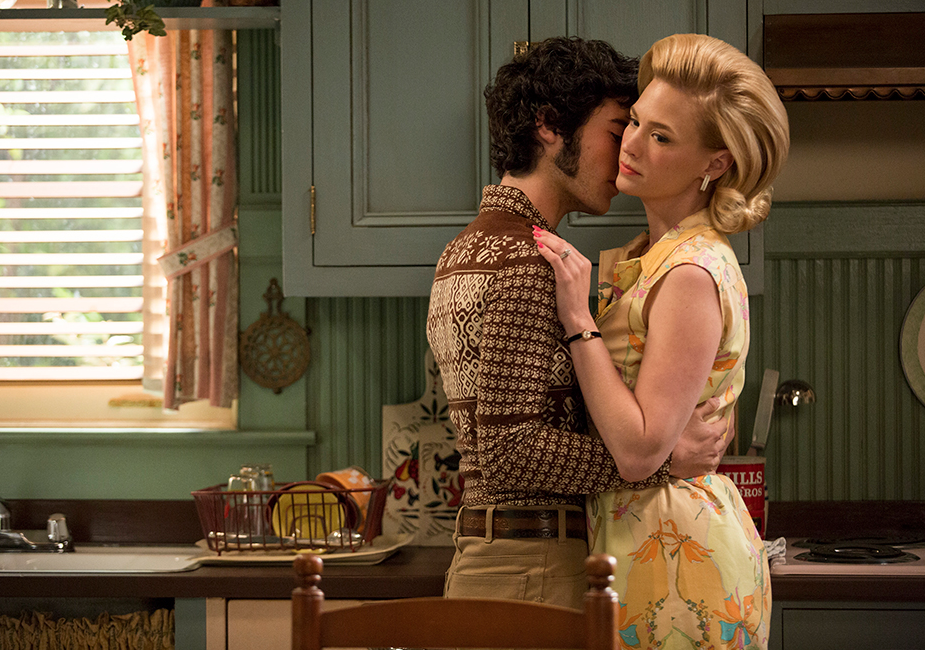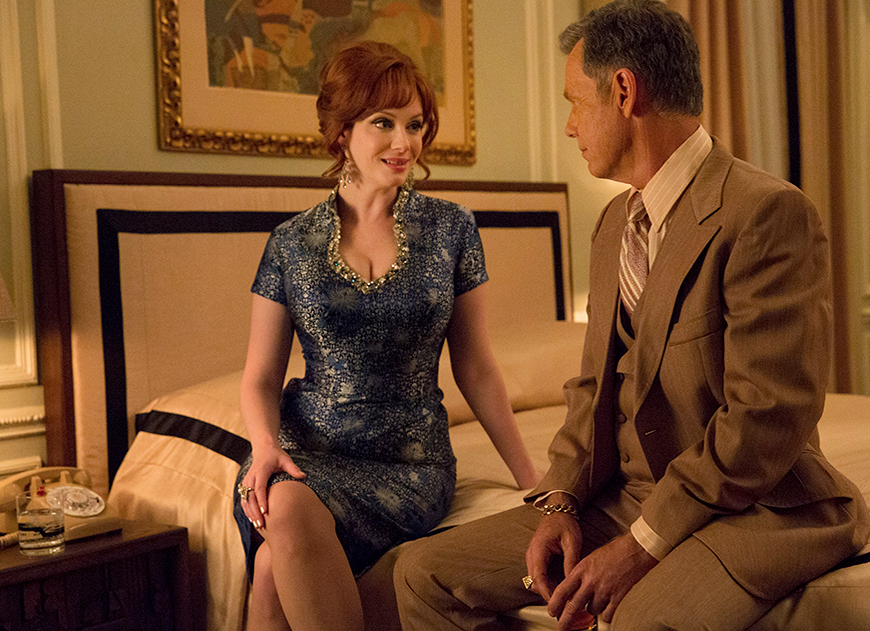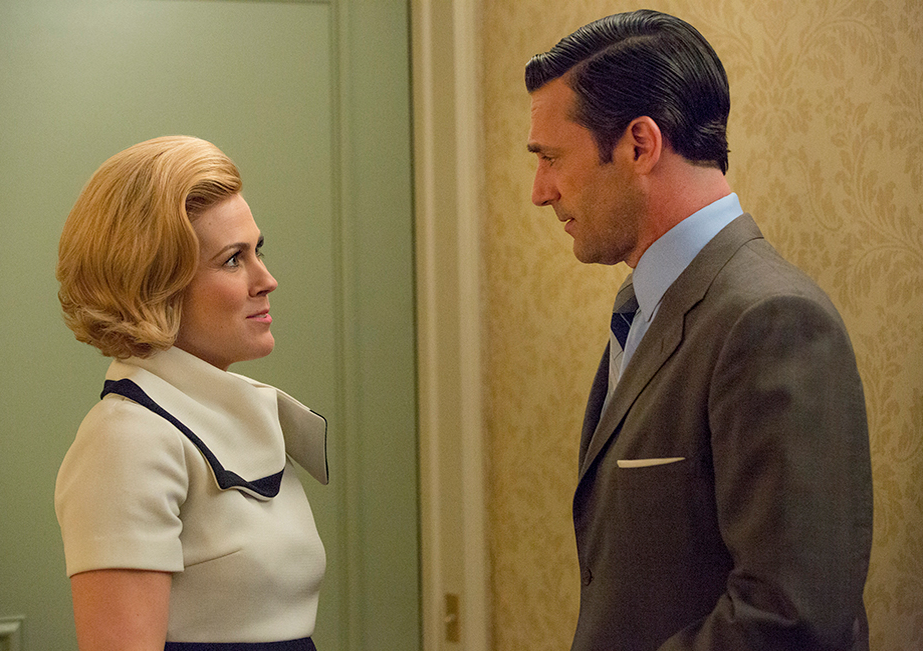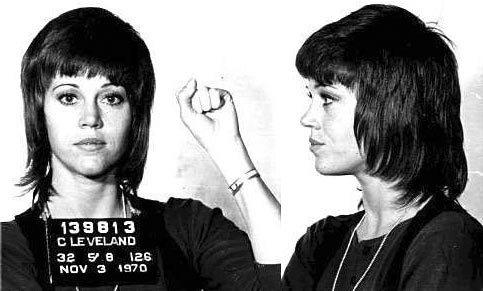Lynn Lee, here again to discuss this week’s Mad Men
 Glen is off to Vietnam but wants a proper goodbye from Betty
Glen is off to Vietnam but wants a proper goodbye from Betty
Maybe Don Draper should have been a movie director. His best ads have a film-like narrative and emotional pull, and going to the movies (something we, perhaps tellingly, haven’t seen him do in a while) seems to recharge his creative batteries. Even now, as he appears increasingly disaffected with the business of selling either his work or his home, he yearns for the kind of high concept that sounds better suited to the big screen, whether it involves the World’s Fair or a fantasy about the inventor of the Frisbee making a million and moving to France. After all, he’s managed to rewrite his own life story – the public version, at least – like the brashest of screenwriters: from poverty to the penthouse.
[Jane Fonda, Vietnam and more after the jump]
It’s got to get better. It’s supposed to get better.”
“Forecast” finds Don struggling to map out the rest of that story. (Let’s hope this isn’t a meta-commentary on the “Mad Men” writers.) Tasked with writing Sterling Cooper’s prospectus for Roger, he keeps circling back to the question, what next? where is it all going? or in the words of an earlier episode, is this all there is? “Let’s assume that it’s good,” he says, ostensibly about the firm, but almost certainly about his own life. “It’s got to get better. It’s supposed to get better.” But why? And how?
His colleagues have their own dreams – bigger accounts, fame, love – that Don finds lacking. Peggy, when pressed, comes closest to meeting his vision (“To create something of lasting value”), only to be justifiably frustrated by what she sees as his devaluation of her work. While Don didn’t mean to slight her, he’s clearly far too preoccupied with his own quest for fulfillment to understand that others are just looking for theirs.
 Joan has a new love interest in Bruce Greenwood
Joan has a new love interest in Bruce Greenwood
He’s not the only one guilty of this error. The episode is rife with characters who seem to be acting out the movie in their head, only to discover that the other people in it are reading from a different script. Joan’s new admirer, envisioning his retirement as a permanent vacation, full of adventure and romance and free of obligation, is upset when his new lover proves to be anything but. Glen casts himself and Betty in a love-and-war melodrama that’s undercut by Sally’s angry disgust, as well as Betty’s own complicated feelings about their relationship.
Mathis tries to play the part of Don Draper and predictably ends up further alienating an insulted client. Even Sally, squicked out by the sexual fascination her parents exercise on her friends, fancies herself the rebel without a cause who becomes someone entirely different from her hypocritical parents, only to be told she’ll always carry their legacy with her. (At least Don leaves her the hope that she can make different choices from them, which is more agency than he allows others.)

Melanie: I’m using everything I have. But this requires too much imagination.”
Don Draper: That’s the best opportunity in the world.”
In the end, though, it comes back to Don. Just when the show seems ready to write him off, his vision comes through when we, and sometimes he, least expects it. Melanie, his realtor, has been needling him about the emptiness of his apartment, which she sees as redolent of sadness and failure. He argues that the emptiness is a positive because it leaves room for people to “imagine their own things” in it. Though unconvinced, she apparently finds subconscious inspiration in his words, as she manages to sell the place at its full asking price. “Now we just have to find a place for you!” she says pertly to Don. If only she knew how hard Don’s been trying to do just that, this entire series.
Movie references: Sadly few for an episode that takes a major character to Sterling Cooper’s L.A. office and puts her up at the swanky Beverly Wilshire! Joan doesn’t run into Warren Beatty (though she does hook up with Bruce Greenwood), and whatever the receptionist believes, it’s pretty unlikely that Lou Avery will ever sell his Gomer Pyle-like monkey cartoon to Hanna Barbera.

The Gomer Pyle reference is interesting, though, in juxtaposition with the Glen-goes-to-Vietnam storyline. His fight with Sally over enlisting serves as a reminder that the simple-minded good soldier act is being rendered obsolete by the real war (Gomer Pyle’s TV show had just gone off the air), even if “Full Metal Jacket” (1987) is still a decade away. Betty the reactionary refers dismissively to Sally as Jane Fonda, who was well known at the time not just for her movie stardom but for her antiwar activism as 'Hanoi Jane'. The Glen-Betty-Sally storyline also carries faint echoes of The Graduate (1967), though Betty ultimately declines the opportunity to play Mrs. Robinson.
Other random thoughts:
- I don’t hate Glen and Betty as much as most people, but I wasn’t exactly longing for closure of that particular subplot. Still, the shot of Betty pitching Bobby’s toy gun into the trash was a nice callback to her season 1 foray into bird-shooting.
- Those ’70s fashions are not growing on me. Who ever thought leisure suits were a good idea?
- Lots of profanity in this episode – a sign of the times?
- Would a realtor really be that rude to her own client?
- We learn that Joan was married (and divorced) before Dr. Douche, something the show’s only referred to elliptically.
Line of the week (as only Pete could deliver it): “We have a peanut butter cookie problem.”